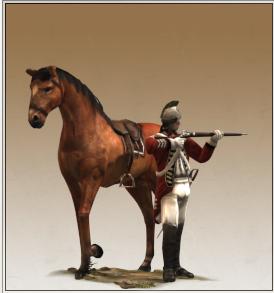Difference between revisions of "Dragoons (ETW Unit)"
Tango12345 (talk | contribs) m (this is not the colonial dragoons page, so I've changed the details section a little.) |
(→Details) |
||
| Line 11: | Line 11: | ||
==Details== | ==Details== | ||
| − | Dragoons can act as a light cavalry force as well as quick-response firepower thanks to their carbines. All dragoons have the option to dismount and act as infantry; however, they are still ill-suited for taking on proper line infantry due to their inferior numbers. Dragoons may fire while astride their horses | + | Dragoons can act as a light cavalry force as well as quick-response firepower thanks to their carbines. All dragoons have the option to dismount and act as infantry; however, they are still ill-suited for taking on proper line infantry due to their inferior numbers and melee statistics. Dragoons may fire while astride their horses, adding firepower to their charge and further damaging enemy troops' morale. |
| + | |||
| + | Dragoons have 25% more manpower than other horse regiments. However, even with this advantage in numbers they cannot normally take on heavy or even light cavalry without support. | ||
Most nations cannot utilize horse regiment formations with dragoons; however, the British can order their dragoons to use wedge or diamond formation for dragoons as soon as the technologies are researched. | Most nations cannot utilize horse regiment formations with dragoons; however, the British can order their dragoons to use wedge or diamond formation for dragoons as soon as the technologies are researched. | ||
Revision as of 08:07, 27 February 2012
Overview
Horses give mobility, not shock value in combat. Dragoons do not charge home, but ride to critical spots on a battlefield where infantry firepower is needed. They carry smooth-bore, muzzle-loading muskets with shortened barrels (to make reloading easier) originally called “dragons” or dragoons; over time, this name transferred to the men.
Dragoons are also useful for riot control and civil suppression (“dragooning” is to bully people into a course of action). Their usefulness as infantry and “cheap” cavalry means that they can put down all kinds of trouble, as cutting down civilians is beneath the dignity of proper cavalry regiments.
Historically, dragoons slowly became cavalry soldiers like any other, and stopped fighting as mounted infantry, although many regiments did retain the name. The cavalry had always regarded them as (lower paid) social inferiors, and the infantry had resented them as not being proper footsloggers, so the dragoons welcomed their new acceptability.
Details
Dragoons can act as a light cavalry force as well as quick-response firepower thanks to their carbines. All dragoons have the option to dismount and act as infantry; however, they are still ill-suited for taking on proper line infantry due to their inferior numbers and melee statistics. Dragoons may fire while astride their horses, adding firepower to their charge and further damaging enemy troops' morale.
Dragoons have 25% more manpower than other horse regiments. However, even with this advantage in numbers they cannot normally take on heavy or even light cavalry without support.
Most nations cannot utilize horse regiment formations with dragoons; however, the British can order their dragoons to use wedge or diamond formation for dragoons as soon as the technologies are researched.
